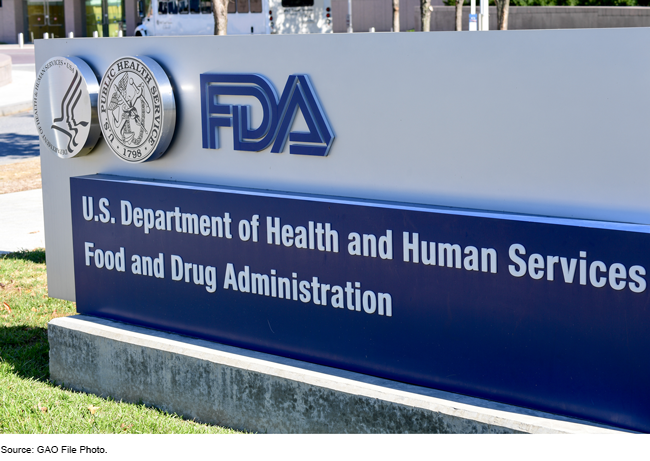Food and Drug Administration: Office of the Executive Secretariat's Processes for Correspondence Were Consistent with Selected Internal Control Standards
Fast Facts
The Food and Drug Administration helps ensure the safety of human medical products and more than 80% of the U.S. food supply, among other things. The Food and Drug Omnibus Reform Act of 2022 includes a provision that we assess how an office within FDA handles correspondence for FDA's Commissioner.
The office receives letters and emails that its staff must determine where to route. Correspondence analysts and policy analysts in this office work with FDA's centers and other offices to answer correspondence directed to senior FDA officials.
We found that the office has processes in place to manage correspondence appropriately.

Highlights
What GAO Found
The Food and Drug Administration (FDA), an agency within the Department of Health and Human Services, is responsible for protecting public health. Among other things, FDA helps ensure the safety, efficacy, and security of human medical products marketed in the United States and the safety of more than 80 percent of the U.S. food supply. Within FDA, the Office of the Executive Secretariat (OES) (sometimes referred to as the Division of Executive Operations) controls and processes all public correspondence directed to FDA's Commissioner.
OES receives correspondence by postal mail, common carrier, and email. Correspondence analysts and policy analysts in OES work with the FDA Commissioner's office and with FDA's centers and offices to respond to correspondence directed to senior FDA officials.
GAO found OES's policies, procedures, and practices for managing correspondence to be consistent with selected internal control standards. For example, OES staff use an information technology system to log incoming correspondence and manage the process of preparing and sending replies. OES also has expectations for responding to different categories of correspondence, and OES's standard operating procedures, updated in April 2024, include regular monitoring of correspondence awaiting a response.
Why GAO Did This Study
The Food and Drug Omnibus Reform Act of 2022—enacted December 29, 2022, as part of the Consolidated Appropriations Act, 2023—includes a provision that GAO assess OES's policies and practices with respect to the receipt, tracking, managing, and prioritization of correspondence.
This report assesses the extent to which OES's policies, procedures, and practices for receiving, tracking, managing, and prioritizing correspondence are consistent with selected internal control standards. GAO considered the functions carried out by OES to manage correspondence and selected internal control standards related to defining objectives; designing control activities; implementing control activities; identifying, analyzing, and responding to change; and communicating information internally to achieve objectives. GAO reviewed FDA policy and procedure documents and interviewed FDA officials and staff who manage correspondence in OES. GAO also visited FDA's headquarters in Silver Spring, Maryland, to observe a demonstration of how OES staff receive and process correspondence and compared this demonstration with OES's correspondence policies and procedures.
For more information, contact Yvonne D. Jones at (202) 512-6806 or JonesY@gao.gov.
